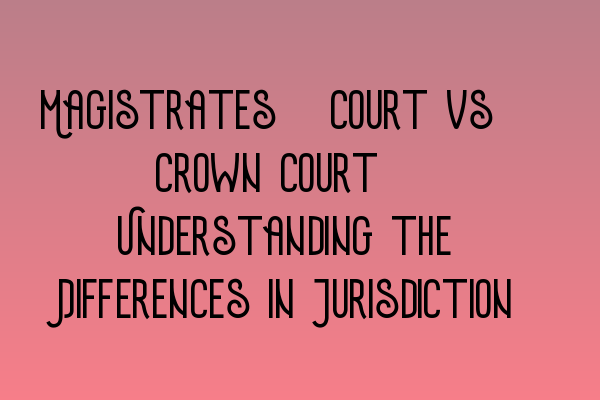Magistrates’ Court vs. Crown Court: Understanding the Differences in Jurisdiction
Welcome to SQE Criminal Law & Practice Law UK, where we provide comprehensive information and support for aspiring solicitors. In today’s article, we will delve into the key differences between Magistrates’ Court and Crown Court, two important elements of the UK judicial system.
Before we explore the distinctions, it is essential to have a basic understanding of the jurisdiction of both courts. Magistrates’ Court is the lower court of the two and deals with less serious criminal offenses. It handles cases such as traffic violations, minor assaults, and petty thefts. On the other hand, Crown Court is the higher court and deals with more serious offenses, including major drug offenses, violent crimes, and fraud cases.
Let’s dive into the differences:
1. Jurisdiction
As mentioned earlier, the jurisdiction of Magistrates’ Court is limited to less serious criminal offenses. It has the power to conduct trials and handle summary offenses, which are crimes with a maximum prison sentence of 6 months. Additionally, it can conduct preliminary hearings for indictable offenses, which are crimes with higher penalties that must be heard in the Crown Court. On the other hand, the Crown Court has unlimited jurisdiction, meaning it can handle any criminal offense, regardless of severity or potential sentence.
2. Trial Process
In Magistrates’ Court, trials are presided over by a panel of three magistrates or a district judge. There is no jury present, and the magistrate(s) make the final decision on the guilt or innocence of the accused. In Crown Court, trials are conducted in front of a judge and a jury. The jury, consisting of twelve members of the public, assesses the evidence and reaches a verdict. The judge then determines the appropriate sentence if the defendant is found guilty.
3. Sentencing Powers
When it comes to sentencing powers, Magistrates’ Court can impose a maximum sentence of up to 12 months for a single offense or 6 months for multiple offenses. They can also fine the defendant or impose community-based penalties. In contrast, the Crown Court has wider ranges of sentencing powers and can hand down longer prison sentences. The judge considers various factors, including aggravating and mitigating circumstances, before deciding the appropriate punishment.
Conclusion
In summary, Magistrates’ Court and Crown Court serve different purposes within the UK judicial system. Magistrates’ Court handles less serious offenses and has limited jurisdiction and sentencing powers, while Crown Court deals with more serious crimes and has broader jurisdiction and sentencing powers.
If you are preparing to take the SQE exams, it’s crucial to have a solid understanding of the UK legal system. To further enhance your knowledge, we recommend exploring our related articles:
- SQE 1 Practice Exam Questions
- SQE 1 Practice Mocks FLK1 FLK2
- SQE 2 Preparation Courses
- SQE 1 Preparation Courses
- SRA SQE Exam Dates
At SQE Criminal Law & Practice Law UK, we are committed to providing reliable and up-to-date information to help you succeed in your legal career. Stay tuned for more insightful articles and resources!
